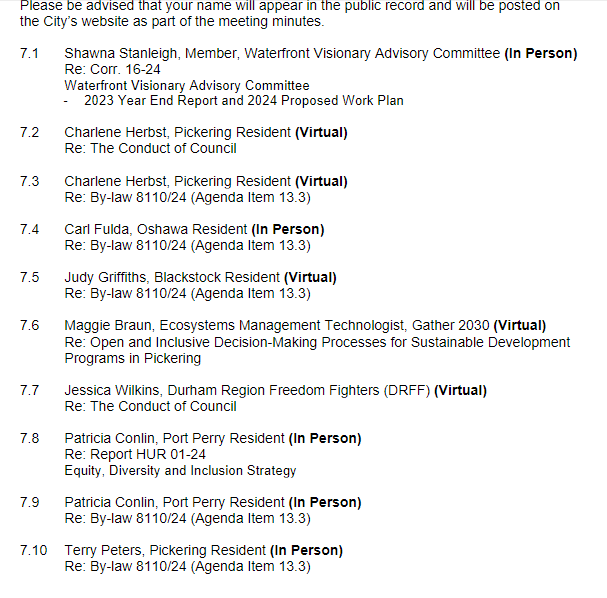Local Voices in Pickering: Advocating for Transparency and Local Prioritization
Pickering, ON – At the recent council meeting, community advocate Maggie Braun took the floor to address the Mayor and Pickering Council. Her speech underscored the critical need for local governance to prioritize transparency and community-driven initiatives over international mandates.
Maggie Braun, with a background in ecosystem management and community advocacy, began her address by highlighting the importance of diverse, dissenting views and healthy debate on issues that directly impact the daily lives of citizens. She pointed to the example of Councillor Robinson, who has championed open discussion on international programs, facing undue criticism for advocating transparency and dialogue.
"Councillor Robinson’s advocacy for open discussion is not just commendable but necessary," Braun stated. "The resistance she faces for simply promoting transparency underscores a troubling trend where local voices are being marginalized in favor of broader, top-down mandates."
Braun emphasized that in a healthy democracy, each action item aligned with international programs requires meaningful public feedback before councils can determine the public's will and direct municipal staff accordingly. She asserted that local or municipal councils are the true guardians of our nation, entrusted with the honor and privilege of protecting communities from undue international influence and lobbyist groups.
"Canada, a developed nation, does not need direction from unelected organizations like the United Nations on how to run our towns, cities, schools, businesses, or manage our land," Braun declared.
She illustrated her point by providing an example from Pickering. Like many Canadian cities, Pickering faces mounting pressures from international agendas and policies such as sustainable development and net-zero by 2050 programs. These initiatives, while well-intentioned, often overlook the unique needs of local communities. Braun’s rough calculations showed a significant disparity in funding allocation: Pickering spends about $4.5 million on climate-focused programs compared to just $1.2 million on critical urban issues like poverty, homelessness, mental health, food assistance, community gardens, and drug addiction rehab centers.
"This disparity is not unique to Pickering; it is a nationwide concern," Braun noted. "Our focus should be on addressing the immediate needs of our community."
Braun further commented on her recent flight over Canada, noting the vast, uninhabited expanses of the country and the natural carbon sink that it represents. She challenged the net-zero goals to limit global temperature increases, citing historical climate patterns that indicate interglacial periods have been warmer than today. Braun called for a diversified approach to understanding climate science, urging councillors to rely on a broader range of information before making significant taxpayer-funded investments.
She recommended the Pickering Council tune into the City of Thorold’s upcoming meeting, where a thorough examination of the Partners for Climate Protection Program will take place. Thorold’s model of rigorous scrutiny and meaningful debate should be adopted by municipalities across Canada.
In conclusion, Braun urged the Pickering Council to direct staff to conduct a comprehensive review of all programs and partnerships aimed at achieving international goals versus those locally founded and aimed at addressing immediate community needs. She offered her assistance in this process, emphasizing the need for a spirit of discussion and healthy debate.
"I sincerely hope your council will embrace this approach, ensuring an environment where every councillor and citizen can freely express their concerns and ideas without fear of retribution," Braun said, closing her speech.
The council meeting's packed agenda featured numerous delegations, each contributing to a robust dialogue on various community issues. To watch the full lineup of delegates, visit the City of Pickering`s YouTube Channel. . Maggie Braun’s address has sparked a crucial conversation about the balance between local priorities and international mandates. Her call for transparency and community-focused governance resonates with many, highlighting the need for councils to listen and respond to the voices of their constituents.
Maggie's Presentation to the Council:
Comparison of Climate-Focused and Sustainable Development Programs vs. Urban Crisis Programs in Pickering, Ontario
The City of Pickering has implemented numerous climate-focused programs and partnerships aimed at enhancing sustainability and reducing greenhouse gas emissions. These programs are compared to those addressing urban crises such as poverty, homelessness, mental health, food assistance, community gardens, and drug addiction rehab centers. Here is a detailed comparison, including approximate annual costs and references.
Climate-Focused and Sustainable Development Programs
Community Climate Adaptation Plan (CCAP)
Objective: Help residents and organizations prepare for and adapt to extreme weather events.
Approximate Annual Cost: $100,000 - $200,000.
References: Let's Talk Pickering, insauga.com
Energy and Greenhouse Gas Emissions Management
Programs: Corporate Energy Management Plan (CEMP) and Partners for Climate Protection (PCP).
Approximate Annual Cost: $500,000.
References: Pickering.ca
Pickering Nuclear Generating Station
Contribution: Managed by Ontario Power Generation.
Approximate Annual Cost: Significant investments by OPG, not directly city-funded.
References: OPG.com
Integrated Sustainable Design Standards
Purpose: Incorporate sustainable practices in developments.
Approximate Annual Cost: $200,000.
References: Let's Talk Pickering
Stormwater Management Design Guidelines
Focus: Use green infrastructure to manage stormwater.
Approximate Annual Cost: $300,000 - $400,000.
References: Pickering.ca
Naturalization Projects and Green Spaces
Activities: Naturalization projects and green space development.
Approximate Annual Cost: $150,000 - $250,000.
References: Pickering.ca
Public Education Programs
Efforts: Workshops and health promotion campaigns.
Approximate Annual Cost: $100,000.
References: Pickering.ca
Environmental Health Programs
Initiatives: Stormwater management and air quality improvement.
Approximate Annual Cost: $300,000.
References: Pickering.ca
Waste Reduction
Initiatives: Recycling programs and waste diversion.
Approximate Annual Cost: $200,000.
References: Pickering.ca
Active Transportation Programs
Efforts: Promote cycling and public transit.
Approximate Annual Cost: $150,000.
References: Pickering.ca
United Smart Cities Program
Objective: Address urban issues with technological solutions.
Approximate Annual Cost: $250,000.
References: United Nations
Community Engagement and Sustainable Development
Focus: Engage residents in sustainability practices.
Approximate Annual Cost: $100,000.
References: Pickering.ca
Sustainable Economic Development
Initiatives: Support job creation and entrepreneurship.
Approximate Annual Cost: $200,000.
References: Pickering.ca
Green Infrastructure and Stormwater Management
Focus: Implement green infrastructure.
Approximate Annual Cost: $300,000.
References: Pickering.ca
Renewable Energy and Energy Efficiency
Programs: Installation of renewable energy systems.
Approximate Annual Cost: $400,000.
References: Pickering.ca
Sustainable Urban Development
Objective: Integrate sustainability in urban planning.
Approximate Annual Cost: $300,000.
References: Pickering.ca
Total Annual Cost for Climate-Focused Programs
Total: Approximately $4.05 million to $4.45 million.
Programs Addressing Urban Crisis
Poverty Alleviation Programs
Initiatives: Financial assistance and housing support.
Approximate Annual Cost: $200,000 - $300,000.
References: Ontario.ca
Homelessness Programs
Initiatives: Shelters and supportive services.
Approximate Annual Cost: $250,000 - $350,000.
References: Ontario.ca
Mental Health Services
Initiatives: Counseling and crisis intervention.
Approximate Annual Cost: $150,000 - $250,000.
References: CMHA Ontario
Cost of Groceries Assistance
Initiatives: Food banks and subsidies.
Approximate Annual Cost: $50,000 - $100,000.
References: Pickering.ca
Community Gardens
Initiatives: Establishment and maintenance of gardens.
Approximate Annual Cost: $30,000 - $50,000.
References: Pickering.ca
Drug Addiction Rehab Centers
Initiatives: Rehabilitation programs.
Approximate Annual Cost: $100,000 - $150,000.
References: CMHA Ontario
Total Annual Cost for Urban Crisis Programs
Total: Approximately $780,000 to $1.2 million.
Comparison and Insights
Climate-Focused and Sustainable Development Programs
Total Annual Cost: $4.05 million to $4.45 million.
Urban Crisis Programs
Total Annual Cost: $780,000 to $1.2 million.
Conclusion:
The City of Pickering allocates more funding towards climate-focused and sustainable development programs compared to addressing urban crises.
Disclaimer
The information provided in this analysis is based on available data and research from various sources. The author is limited in research capacity and may not have access to all relevant information regarding the City of Pickering’s programs and partnerships.
It is recommended that the Pickering City Council direct staff to conduct a comprehensive review of all programs and partnerships aimed at achieving international goals versus those founded locally. This review should include a detailed assessment of the costs associated with each category to ensure accurate and comprehensive budgeting and strategic planning.
For more detailed information, you can visit:
Pickering’s official budget webpage
Pickering Sustainability
Ontario Poverty Reduction Strategy
Homelessness Prevention Program
To get involved, learn more and support check out the kiclei.ca Action Plan Page and explore from there.
Let`s Go Canada!
Maggie Braun






















Local Voices in Pickering: Advocating for Transparency and Local Prioritization